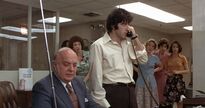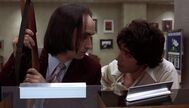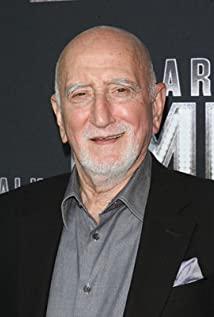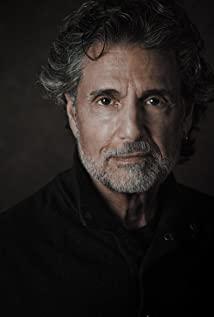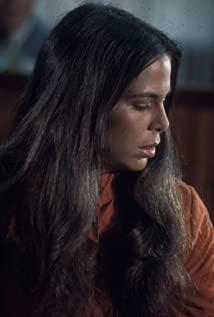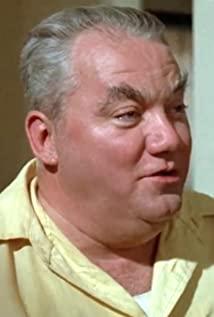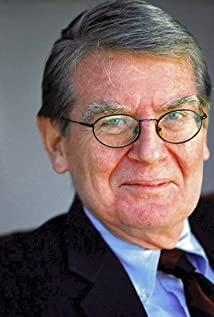If the title of the film is translated as "Afternoon of Dog Days", it would be quite fitting. Although dog day means "hot dog".
Midnight, in fever, shivering down the spine, aching all over, I watched the film. Such a cute robber, give me a dozen. Attica! Attica! Attica! Oh f***, what's he doing here? Oh f** *, what am I doing here?
There is almost only one scene in two hours. The external plot is simple, but after watching it, it doesn't feel long. What attracts people is the inner drama, which depends entirely on the acting. It is inevitable to praise Apa's acting skills. From the very beginning, when he was still in the car, his big eyes revealed tension, and his body movements were sudden, showing the nervousness of the characters. When he entered the bank and took out the big gun, he was so stupid that it was hard to believe that he could still play Scarface later. Later, after calling his two wives, he put his hands on his face, his empty and confused eyes; The policeman pressed on the hood and felt distressed and helpless when he saw Sal being shot in the head. Seeing the hostages walking away without looking back, he seemed to be nostalgic. "I've taken care of you for so long, you can say goodbye to me." But which hostage would miss the robber? I can't help but want to say to this hapless robber: It doesn't matter. It is not your fault and I will wate for you. How can Apa's eyes show such rich and moving emotions? What a sensitive heart he has!
Only by understanding Sonny's eyes can you truly understand this personal emotional drama.
If you have to change the terminology, it is Sonny who suffers from Stockholm, not the hostages. His mother and his two wives kept demanding from him, and he would not hesitate to rob a bank to satisfy them. And they, only think of themselves, no one is really connected to Sonny's heart. Sonny still considers himself responsible to these "family members." He desires to be truly connected with people, so he will extremely imprison his wife's freedom of life and prevent him from making friends with others. "I'm dying." He was really calling for help, but who was listening?
Switching to the robbery scene on camera, Sonny also felt that he was responsible for the safety of the hostages. Which robber in the world is responsible for the safety of the hostages? Sonny automatically put himself in the position of being responsible for others in order to hope for the kindness of others. And the hostages showed some interest in him and wanted to listen to him. Even a little concerned. "What did you do, didn't you have a plan? (You're going to die)" The fat manager fell ill, but he took the initiative to stay when he could leave. "I'd rather you didn't walk into this bank this afternoon." On the one hand, he had to protect his Helping female subordinates, on the other hand, do you want to see Sonny "die well"? This is pure speculation, of course, but it is true that not long after the robbery started, the "robbery" was gradually changing its nature and became a frenzied show. After You Qi called his two wives and saw his mother, he didn't want to rob him at all. Why not just surrender yourself? Because Sal wouldn't agree, he'd rather die than be caught and go to jail. Keizer's performance is also remarkable, showing a cowardly madman incisively and vividly. I thought it was because Sonny was actually "reluctant" to be separated from the hostages who showed interest in him.
How could Sonny really believe he was going to Algeria? At the beginning, there may be some naive idea, at least to find a decent way to get out of the bank. Later, his heart was cold and he no longer wanted to go anywhere. He left a will. He also thought of the possibility of being shot dead by the police. He wanted the plane, and he was working with Officer Sheldon to save the hostages. The fat policeman before was untrustworthy, his subordinates dared to act without obeying his orders, and American society generally did not like policemen. Sheldon seems to be able to control the situation, you see, after the police officer enters the bank, Sonny has erratic and suspicious trust in his eyes, and when he turns around, he lied to Sal; you see, the police officer told him "ten miniutes", all in He lip-synced the password.
Why don't you see the opportunity to take the hostages, or hand over Sal? How could Sonny betray his friends, he said it himself. As for the hostages, on the one hand, there was the Attica incident before, and he was worried that the police would accidentally injure the hostages. On the other hand, when he returned to Stockholm, Sonny linked himself and the hostages with "responsibility" in this extreme situation. This fanatical desire and He can't get out of the inner drama of connecting with others. What reflected in his mind was the transformed reality.
Sonny vaguely felt that Sal was the focus of the police and could be killed. He could also be killed. How could there be a policeman who would be merciful to the robbers? It's okay to die together, but it doesn't count as betrayal of friends. But he instinctively didn't want to die, "Don't shoot me."
So there is the complicated look at the end that is difficult to express in words.
Pashen's play has the most eye-catching eyes. Whether it is the sullen Micheal Corleone or the eloquent little sweet bean robber, they all use their eyes to express the heart of the characters that cannot be expressed by the lines - after all, these words It would be embarrassing to say it. As Pashen said in the "Actor's Studio" interview, he "sucked" the characters into his body, and then showed it instinctively. This is more ruthless than "going deep into the heart of the character".
View more about Dog Day Afternoon reviews



